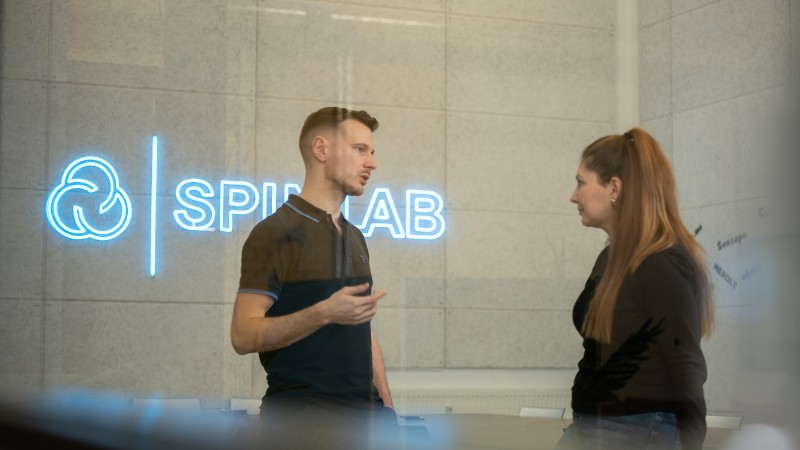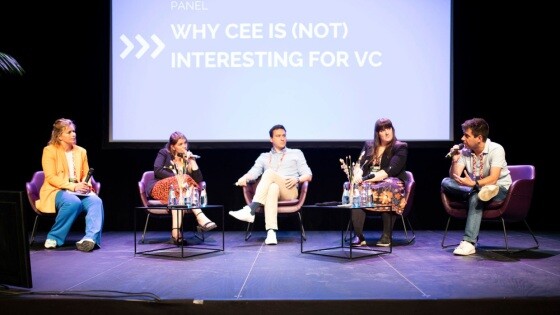At this year’s HHL SpinLab Investors Day #15, more than 200 guests, including venture capital funds, business angels, and corporates from all over Europe – France, Belgium, Tallinn, Poland, and Italy – came to Leipzig. One of this year's topics was shifting from software to hardware startups.
 More than 200 guests attended the 15th HHL SpinLab Investors Day in Leipzig. Photo:Fabian Thüroff
More than 200 guests attended the 15th HHL SpinLab Investors Day in Leipzig. Photo:Fabian Thüroff
We invited Philipp Semmer (Earlybird), Stefan Albers (Xange), Maxi Pethö-Schramm (HV Capital) and Andreas Winter-Extra (KOMPAS VC) to discuss the complexities and opportunities of investing in and scaling hardware startups.
THE DIFFERENCE BETWEEN HARDWARE & SOFTWARE STARTUPS
The startup ecosystem has traditionally been dominated by software ventures, characterized by their lower initial costs, faster iteration cycles, and scalable digital distribution. Hardware startups, on the other hand, face longer development cycles due to the need for extensive testing, regulatory approvals, and manufacturing setup.
Philipp Semmer, highlighted this distinction: "Venture capitalists used to say hardware is hard - we don’t do it. Luckily, there has been a shift. A lot of hardware topics have a certain political and strategic momentum (...), and it’s very helpful if you have the support of politicians and public opinions." This momentum is particularly evident in sectors like semiconductors, quantum computing, and climate tech, where strategic support can help navigate the extended timelines inherent in hardware development.
OVERCOMING THE HURDLES
So why is there still so much more investment in software rather than hardware startups? With a total market exceeding €200 billion and an annual growth rate of 5% in the German-speaking region, the hardware sector offers immense potential for hardware startups. According to a study by Ernst & Young, Germany alone is home to over 4000 hardware startups, active in areas such as robotics, IoT, and electromobility. Despite the growing interest and investment in hardware ventures across Europe, there are some challenges that may make potential investors hesitant when it comes to funding hardware. Hardware investments take longer to scale and exit. The political and strategic support in certain sectors helps mitigate these extended timelines.
According to Stefan Albers, hardware investments demand particularly careful valuation and de-risking strategies. He stressed the need for understanding and mitigating risks at each stage of fundraising, highlighting the specific challenges in valuing hardware startups compared to software ventures.
Maxi Pethö-Schramm discussed the necessity of clear intermediary milestones for hardware startups, such as technology readiness levels, which are crucial for attracting continued investment. This requirement contrasts with the more predictable development paths of software startups. Andreas Winter-Extra added that while traditional VC funds can invest in hardware, timing and industry-specific knowledge are critical. He emphasized the importance of collaboration among investors to share capital demands and bring diverse expertise to hardware ventures.
HOW TO INVEST AND SECURE INVESTMENTS AS A HARDWARE STARTUP
As stated by the panelists, investing in hardware startups requires meeting several key criteria. Investors must grasp the specific risks and technicalities involved in hardware ventures and understand these risks in different industries. Hardware investments also often require collaboration among multiple investors to share capital demands and bring diverse expertise.
Managing limited partner (LP) relations can be challenging for hardware investments due to longer timelines and higher capital requirements. Andreas Winter-Extra noted the importance of showing tangible progress to maintain LP confidence, while Maxi Pethö-Schramm pointed out the need to be transparent in reporting on your progress to secure continued funding.
We can’t solve tomorrow’s problems with software alone
The panel talk made clear that transitioning from software to hardware startups involves embracing a different set of challenges and strategic approaches. While the journey is more capital-intensive and time-consuming, the potential rewards and impact, particularly in sectors like climate tech and semiconductors, are significant. Investors and founders must be prepared for a collaborative, well-informed approach to navigate the complexities of hardware ventures successfully. As Philipp Semmer put it, "Hardware is super attractive if you find the right things, and we can’t solve tomorrow’s problems with software alone - but you need to know how to do it."
Recap Investors Day 2024






/RootCamp_Logo-Ecosystem.png?width=200&name=RootCamp_Logo-Ecosystem.png)
/Bitroad_Logo-Ecosystem.png?width=200&name=Bitroad_Logo-Ecosystem.png)



/White%20Versions/stadt_leipzig_white.png?width=130&name=stadt_leipzig_white.png)
/lfca_white.png?width=119&name=lfca_white.png)
/bmwi-white-engl-2022.png?width=573&name=bmwi-white-engl-2022.png)
/White%20Versions/sachsen_signet_white.png?width=90&height=362&name=sachsen_signet_white.png)